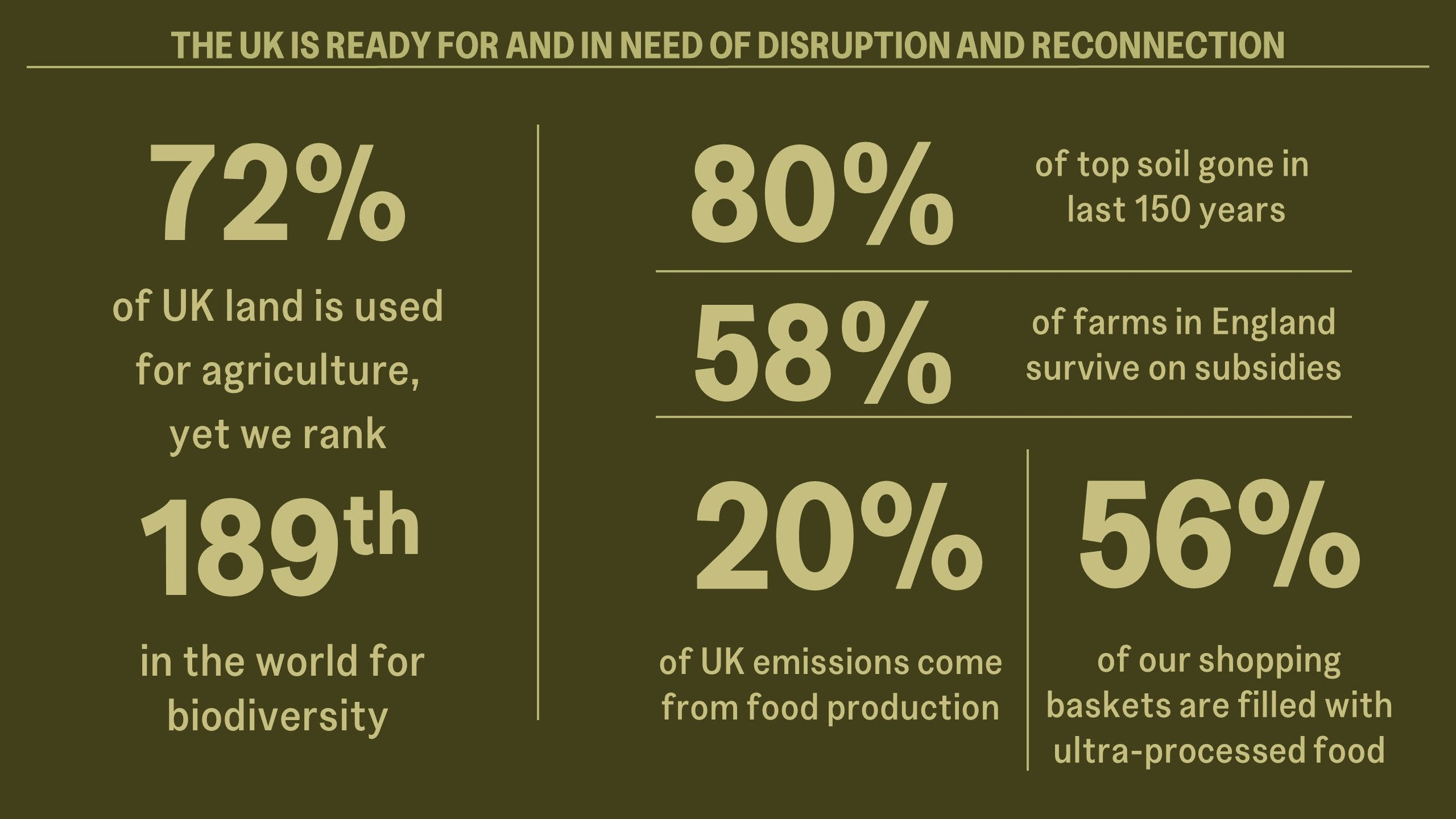FIVE PLANET-THREATENING REASONS; WHY NEW FOUNDATION FARMS EXISTS
By Kirsty Saddler|29the April 2021|Categories: News|Tags: Short read
It’s time we looked differently at our land, how we work with it and the food we eat from it. There are many more than five reasons why we should do this now, but these are the most significant reasons that prompted us to develop New Foundation Farms, an agrifood enterprise that is out to prove the economic and ecological benefit of regenerative farming, a radically natural approach to reconnecting us all to nature.
1. It starts with the ground beneath our feet.
Soil is so very precious. Near 95% of our food comes from it and 25% of our planet’s biodiversity lives within it. It is the foundation for healthy and productive societies and great civilisations have fallen when their soils degraded (read more on this in Carolyn Steel’s brilliant book ‘Sitopia’).
In the UK we have lost 80% of our topsoil since 1850, which is pretty staggering and means the bacteria which convert organic matter into nutrients, which are crucial for the support of biodiversity, are lost with it. Estimates vary but we may only have about 70 harvests left due to the degradation of our soil and each of those will provide food that’s a little bit less nutritious, as for example one government report highlights that in 1991 we would need to have eaten 10 tomatoes to get the same amount of copper as just one tomato provided in 1941.
So while we give our attention to electric vehicles, vegetable leather sneakers and compostable packaging as miraculous solutions to the climate crisis, we’re ignoring the planetary asset which has the potential to perform miracles – carbon capture by the world’s farmland soil could be 10 billion tonnes of CO2 a year, more than the annual CO2 accumulation in the atmosphere, if they were better managed. This would dramatically mitigate the risk of global heating to more than 1.5 degrees.
2. The food and farming industries can be significant nature based solutions to the climate crisis.
What is the agrifood industry? Basically it’s a really long multi-link chain that stretches from farming through to harvesting, processing, transporting (a big part), packaging, promoting and selling our food.
It’s a chain in which there are a few very powerful links, as the top ten agrochemical companies control 84% of the market and the top 10 food & drinks processors control 90% of the market. The whole system is now geared towards the economics for the corporate few, not the economics and ecology that would benefit the many citizens.
In this chain farming is really crucial yet relative to the other links it makes up relatively low value, 8.3% to be exact. Yet this the way most conventional farming is happening, the intensity of food processing and high volumes of waste, food production and consumption is generating about a quarter of our emissions in the UK.
There are other ways to farm and organic farming has seen the greatest increase in interest and market value in the last 15 years, but it still focuses on inputs more than outcomes and organic produce is only proven to have greater nutritional value than conventionally farmed produce in the context of milk and meat.
3. Farming in the British Isles is a challenged model
A lot of our land is used for agriculture, 72% in fact. And there are over 190,000 farms up and down the country with the vast majority of them less than 50 acres and family run.
More than half of farms also wouldn’t be profitable if it weren’t for subsidies, which is due to increasing running costs and fixed commodity costs – many farmers talk about increasing cost, yet in the case of one Sussex dairy farmer the price paid for their milk is the same as 30 years ago.
There is so much good in the industry, we don’t dispute that, but the economics of conventional farming are not strong enough for a majority of farmers. Ecologically more change is needed in farming practices to give us a real prospect of large scale mitigation of the negative impacts and better, the prospect of consistently positive impacts.
4. Eating is something we all do, often, and the way we eat is making us ill yet it could make our lives better.
Diet is now the second biggest killer after smoking in the UK and with ultra processed food making up more than half of the average shopping basket plus the ongoing issue around the quality of school meals, we are not on track to address this.
Yet links have been made between diet and the contribution it makes to our gut health and, more recently, better gut health meaning people could be less adversely affected by Covid.
5. We need to rediscover ways to connect to nature.
Over 80% of us live in urban areas which is far higher than the world average and has led to a greater disconnection with our rural and natural spaces. This is as there is ever greater proof of the benefits to our mental and physical wellbeing if we spend time in nature or have a healthy connection to it, in the government’s 25 Year Environment Plan they state:
Spending time in the natural environment – as a resident or visitor – improves our mental health and feelings of wellbeing. It can reduce stress, fatigue, anxiety and depression. It can help boost immune systems, encourage physical activity and may reduce the risk of chronic diseases such as asthma. It can combat loneliness and binds communities together.
And charity Doses of Nature have put together a really comprehensive summary of the latest research and theories that support this statement.
As we are faced with greater change to our climate, more natural disasters and unforeseen human conditions such as the pandemic we need the resilience that a connection to nature provides us more than ever. The better we connect with nature, the more we’ll value the food it provides us.
These are five big WHYS that inspired the creation of New Foundation Farms and motivate us as we fundraise to launch the enterprise.
In the next post we’ll talk about WHAT our response is to these.

